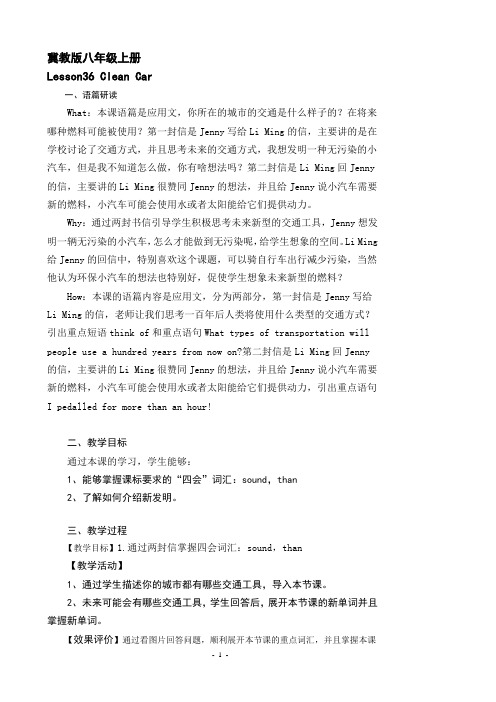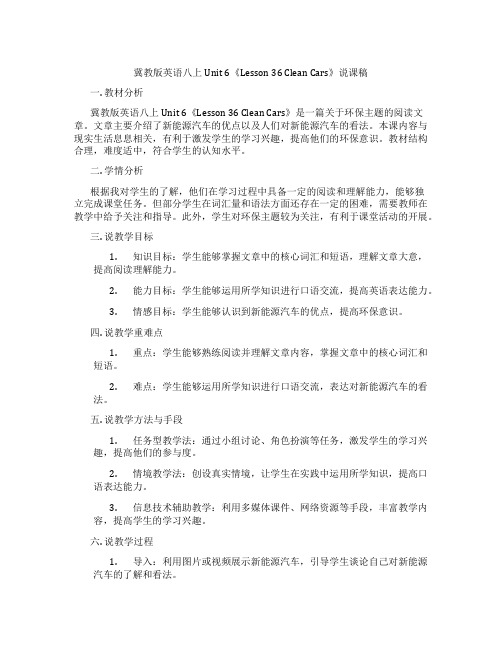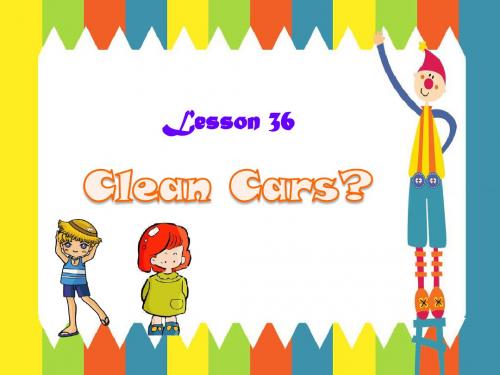Lesson36 Clean_cars
Unit 6 Lesson 36 Clean Cars教案冀教版八年级上册英语

UNIT 6 Go with Transportation!Lesson 36: Clean Cars?教学目标通过本课节的教学,学生达成以下目标:1.知识目标掌握单词:than接触单词:pedal, energy短语:from now on, think of, jump down, more than2.能力目标(1)了解交通工具的发展情况;(2)能够运用所学知识介绍新型交通工具。
3.情感目标培养环保意识,节约能源,践行绿色发展理念。
重点难点1.重点:掌握本课节的单词、短语和句型。
2.难点:运用所学知识介绍新型交通工具。
教学准备PPT 课件;本课节用到的音频文件。
授课时数1课时教学过程Step 1 Lead-inAsk the students to think about the two questions.What’s the transportation like in your city?What different kinds of fuel may be used in the future?Step 2 Vocabulary1.Teach the new words of this lesson.sun/water/wind energy n.能量pedal n.踏板v.踏……的踏板;骑自行车than prep. & conj.比2. Ask the students to read the new words in groups and try to remember them.Step 3 Listening and reading1. Listen and tick the correct answers.(Let’s Do It! No. 1.)(1) Jenny and Li Ming talked about different types of transportation over the next ________ years.□one hundred□one thousand□one million(2) Jenny would like to invent a ________.□hoverboard□clean car□backpack(3) Li Ming travelled across the city by ________.□bus□bike□trainAsk the students to read the sentences and then listen to the passage.Ask them to tick the correct answers.Check their answers.Answers:(1) one hundred (2) clean car (3) bike2. Ask the students to read the lesson and answer the questions.(1)What did they discuss?(2)What did the teacher ask them to do?(3)What’s the name of Danny’s old backpack?(4)What would Jenny like to invent?(5) What kinds of fuel will cars probably use to power them in the future?Check the answers in groups.Ask and answer in pairs.Answers:(1)They discussed transportation.(2) The teacher asked them to think about the future of transportation.(3) It’s name is “Flying Donuts” .(4) She would like to invent a clean car.(5) In the future, cars will probably use water or sun energy to power them.3.Ask the students to find out the phrases and translate them into Chinese.learn about 获悉,了解ask sb. to do sth. 要求某人做某事a hundred years 一百年from now on 从现在开始think of 想出;想起;记起put on 背上,穿上jump down 跳下sound like 听起来像be bad for 对……有害more than 超过;多于go well 进展顺利4. Read the lesson and fill in the blanks. (Let’s Do It! No. 2.)This week,Jenny’s class discussed ________. They ________ about trains,planes,rockets and more. The teacher asked them to think about the future of transportation. They had to think of an invention and ________ it to the class. Danny gave a very interesting presentation. He ________ on an old backpack. He _______ on a chair and ________ down. He wanted to fly.Students do the exercise independently, then check the answers in groups.Answers: transportation; learned; present; put; got; jumpedAsk them to try to repeat the passage.s Do It! No. 3.)1. The air in the mountains is much ________ than it is in the cities.2. He _________ a good idea to solve the problem.3. Everything _________ last week. The newcomer got on well with the others.4. Danny stood in front of the class and gave his___________ on his new form of transportation.5. Eating too much junk food _________ our health.6. Your idea ________ fun.Answers:cleaner; thought of; went well; presentation; is bad for; sounds/soundedStep 4 Pair work1. Ask the students to discuss the advantages and disadvantages of different types of transportation listed in the table. (Let’s Do It! No. 4.)2.Once students have finished filling out the table they may discuss their answers with another pair of students.3.Ask each pair to present their findings to the class.Step 5 Language points1.The teacher asked us to think about the future of transportation.老师让我们考虑一下未来的交通情况。
冀教版英语八年级上册 Lesson 36 Clean Cars

Listen to the tape and fill in the table.
Future transportation (1)Jenny’s class discussed transportation this week in school. (2)Danny gave his presentation. He put on an old __b_a_c_k_p_a_c_k_
room and turn off the tap(水龙 头)in time after using it.
3.We should use cloth bags
(布包) in our daily life instead of(代替的是) plastic ones.(塑料袋)
4.We should make full use of paper and we’d better
the traffic jam
pollute the air
Do you know any new energy?
the heavy haze
the high PM2.5
Wind energy is much cleaner than oil.
energy n. 能量
than prep. 比
[ˈenədʒɪ]
Unit 6 Go with Transportation! Lesson 36 Clean Cars?
1.获取本篇应用文的内容,想象未来的交通工具,思考哪些是有 利于保护环境的清洁能源,形成信息结构图。(学习理解) 2.通过讨论未来的交通工具以及交通工具所使用的燃料,增强环 保意识。(应用实践) 3.运用本课所学句型,结合信息结构图,用英语讨论自己设想的 交通工具所使用的燃料,并将其形成一篇文章介绍给自己的同伴。 (迁移创新)
冀教版英语八年级上册Lesson36CleanCar教学设计

此外,学生在小组合作中,需要提高自己的沟通能力和团队协作能力。教师在教学过程中应关注学生的个体差异,鼓励他们积极参与讨论,充分发挥每个学生的潜能,提高他们的英语综合运用能力。
3.合作学习,提高能力:学生在小组合作中,共同收集、整理关于清洁能源汽车的信息,并通过讨论、辩论等形式,提高自己的沟通能力和团队协作能力。
4.情感教育,渗透课堂:在教学过程中,教师适时引导学生关注环保问题,让他们认识到清洁能源汽车在减少空气污染、保护环境方面的重要性。同时,鼓励学生关注科技发展,尤其是新能源技术的应用,激发他们对未来科技的兴趣。
3.教师讲解课文中的重点句型,如:“The car pollutes our environment.”、“We can reduce air pollution by using clean cars.”等,并让学生进行实际操作,运用句型进行句子表达。
4.教师通过图片、视频等教学资源,向学生介绍清洁能源汽车的工作原理及优点,如:electric car、hydrogen car、fuel-efficient car等。
冀教版英语八年级上册Lesson36CleanCar教学设计
一、教学目标
(一)知识与技能
1.学生能够掌握本课的生词,如:pollute、carbon、dioxide、emission、energy、consume、engine、electric、hydrogen、fuel、efficient、reduce、power、plug、battery、gasoline、petrol、fill、tank、motor、vehicle、transportation、clean、environmentally、friendly等。
河北省冀教版英语八年级上册第36课 clean cars

I will start to exercise from now on. 从现在起我要开始锻炼。
From now on,You are a man. 从现在起你是一个男子汉了。
kind /kaɪnd/ n.种类;类型
a kind of...“一种……” all kinds of...“各种各样的……” different kinds of...“各种各样的……
I don't know how __t_o_a_n_s_w_e(ranswer) the question.
二,连词成句
future, discuss, our, let's (.)
Let's discuss our future.
read, often, he, more, should (.)
He should read more often.
flew, a, my, father, to, yesterday, city (.)
My father flew to a city yesterday.
often, his, thinks, he, hometown, of (.)
He often thinks of his hometown.
sound /saʊnd/ v.听起来 n. 声音
sound表示“听起来”,是一个连系动词,后面常接形容词作表语。
It sounds like a great idea.
你的主意听起来不错。
【例题】
—Listen,the song ________ sweet. —It's I believe,one of my favorite songs. A.sounds B.smells C.feels
Unit 6 Lesson 36 Clean Cars _教案 冀教版八年级英语上册

Unit 6 Go with Transportation! Lesson 36:Clean Cars?㈠Teaching Aims.1.Master this lesson’s new words: pedal; than; energy2.Master these key expressions: think about; from now on; present sth. to sb. put on; jump down; on a bike3. Understand the meaning of the text.㈡Important points(学习重点)①Master new words and expressions②Understand the meaning of the text.③summary the whole Unit㈢Teaching stepsStepⅠ Warm-up(热身)Greetings.Review words and expressions learnt in last lesson.Teacher:What’s the transportation like in our city?你们城市的交通工具什么样?What different kinds of fuel may be used in the future?未来可能会用什么不同种类的燃料?引入本课的话题,激发学生课堂参与的积极性。
StepⅡ PreviewPreview the new words.Give students 5 minutes to recite and check with partners, and finish the part of words of the learning plan.Listen to the tape of the text and read the passage, and finish the learning plan.Step Ⅲ Presentation1. Show new words on the PPT2.Listen and tick the correct answers.1. Jenny and Li Ming talked about different types of transportation over the next________ years.( ) one hundred ()one thousand ( ) one million2. Jenny would like to invent a __________.( ) hoverboard ( ) clean car ( ) backpack3. Li Ming traveled across the city by _________.( ) bus ( ) bike ( ) train4. Introduce language points.(1)The teacher asked us to think about the future of transportation.老师让我们考虑一下交通工具的未来。
〖2021年整理〗《Lesson36Clean Cars课文详解》优秀教案

Leon 36: Cean Car课文详解LANGUAGE NOTES1 What t now on 一百年后人们将使用什么样的交通工具呢?100 ear from now on = 100 ear from now = in 100 ear 意思是“在100年后”,用于一般将来时。
例如:How wi now on 从现在起再过一百年人们将如何旅行呢?2 We had to thin of an invention and miing face 他总是露出平和的微笑。
Mone 金钱对他们来说不是问题。
mother a uic 音乐之声She awaened to the ound of bird inging 她听到鸟叫声醒来了。
Lia wa o fright ened that he coudn’t mae a ound 莉莎实在吓坏了,不敢弄出一点声音4 ore often That wa, our air woud be a ot ceaner 人们应该多走路或者骑自行车。
这样空气会干净许多。
more often是often的比较级,表示“常常;经常;时常;在大多数情况下”。
例如:I fet orr for not viiting m ore often 我因没有常去看望父母而感到内疚。
ore and more often 死于癌症的人越来越多了。
a ot ceaner表示“干净得多”,a ot 用于比较级前,表示“……得多”。
5 I hoe our reentation goe we 我希望你的展示顺利。
go 在这句话中表示“进展,进行”。
例如:The hour went ow 时间慢慢流逝。
The interview went ver bad 访问极不顺利。
+Lesson36+Clean+Car教学设计 冀教版英语八年级上册

冀教版八年级上册Lesson36 Clean Car一、语篇研读What:本课语篇是应用文,你所在的城市的交通是什么样子的?在将来哪种燃料可能被使用?第一封信是Jenny写给Li Ming的信,主要讲的是在学校讨论了交通方式,并且思考未来的交通方式,我想发明一种无污染的小汽车,但是我不知道怎么做,你有啥想法吗?第二封信是Li Ming回Jenny 的信,主要讲的Li Ming很赞同Jenny的想法,并且给Jenny说小汽车需要新的燃料,小汽车可能会使用水或者太阳能给它们提供动力。
Why:通过两封书信引导学生积极思考未来新型的交通工具,Jenny想发明一辆无污染的小汽车,怎么才能做到无污染呢,给学生想象的空间。
Li Ming 给Jenny的回信中,特别喜欢这个课题,可以骑自行车出行减少污染,当然他认为环保小汽车的想法也特别好,促使学生想象未来新型的燃料?How:本课的语篇内容是应用文,分为两部分,第一封信是Jenny写给Li Ming的信,老师让我们思考一百年后人类将使用什么类型的交通方式?引出重点短语think of和重点语句What types of transportation will people use a hundred years from now on?第二封信是Li Ming回Jenny 的信,主要讲的Li Ming很赞同Jenny的想法,并且给Jenny说小汽车需要新的燃料,小汽车可能会使用水或者太阳能给它们提供动力,引出重点语句I pedalled for more than an hour!二、教学目标通过本课的学习,学生能够:1、能够掌握课标要求的“四会”词汇:sound,than2、了解如何介绍新发明。
三、教学过程【教学目标】1.通过两封信掌握四会词汇:sound,than【教学活动】1、通过学生描述你的城市都有哪些交通工具,导入本节课。
2、未来可能会有哪些交通工具,学生回答后,展开本节课的新单词并且掌握新单词。
冀教版英语八上Unit 6《Lesson 36 Clean Cars》说课稿

冀教版英语八上Unit 6《Lesson 36 Clean Cars》说课稿一. 教材分析冀教版英语八上Unit 6《Lesson 36 Clean Cars》是一篇关于环保主题的阅读文章。
文章主要介绍了新能源汽车的优点以及人们对新能源汽车的看法。
本课内容与现实生活息息相关,有利于激发学生的学习兴趣,提高他们的环保意识。
教材结构合理,难度适中,符合学生的认知水平。
二. 学情分析根据我对学生的了解,他们在学习过程中具备一定的阅读和理解能力,能够独立完成课堂任务。
但部分学生在词汇量和语法方面还存在一定的困难,需要教师在教学中给予关注和指导。
此外,学生对环保主题较为关注,有利于课堂活动的开展。
三. 说教学目标1.知识目标:学生能够掌握文章中的核心词汇和短语,理解文章大意,提高阅读理解能力。
2.能力目标:学生能够运用所学知识进行口语交流,提高英语表达能力。
3.情感目标:学生能够认识到新能源汽车的优点,提高环保意识。
四. 说教学重难点1.重点:学生能够熟练阅读并理解文章内容,掌握文章中的核心词汇和短语。
2.难点:学生能够运用所学知识进行口语交流,表达对新能源汽车的看法。
五. 说教学方法与手段1.任务型教学法:通过小组讨论、角色扮演等任务,激发学生的学习兴趣,提高他们的参与度。
2.情境教学法:创设真实情境,让学生在实践中运用所学知识,提高口语表达能力。
3.信息技术辅助教学:利用多媒体课件、网络资源等手段,丰富教学内容,提高学生的学习兴趣。
六. 说教学过程1.导入:利用图片或视频展示新能源汽车,引导学生谈论自己对新能源汽车的了解和看法。
2.阅读理解:学生独立阅读文章,完成相关练习,教师进行讲解和解答。
3.词汇学习:学生学习文章中的核心词汇和短语,教师进行讲解和举例。
4.小组讨论:学生分组讨论文章内容,分享自己的观点和感受。
5.角色扮演:学生分组扮演文章中的角色,进行情景模拟,运用所学知识进行口语交流。
6.课堂总结:教师引导学生总结课堂所学,强调环保意识。
Lesson 36Clean Cars

2. Jenny would like to invent a ________. A hoverboard B clean car C backpack 3. Li Ming travelled across the city by ________. A bus B bike C train
Lesson 36Clean Cars.
very clear goals.
Lesson 36
Clean Cars?
Objectives:
1.To listen and understand the letter about clean cars
2. To learn some key words and useful expressions
Read the lesson and fill in the blanks.
This week, Jenny’s class discussed _tr_a_n_s_p_o_r_t_a_ti_o_n_. They __le_a_r_n_e_d_ about trains, planes, rockets and more. The teacher asked them to think about the future of transportation. They had to _t_h_in_k__o_f_ an invention and p__re_n_s_e_n_t_ it to the class. Danny gave a very interesting presentation. He put on an old backpack. He got on a chair and _j_u_m__p_e_d_ down. He wanted to fly.
Unit 6 Lesson 36 Clean Cars 教案新部编本

教师学科教案[ 20 – 20 学年度第__学期]任教学科:_____________任教年级:_____________任教老师:_____________xx市实验学校Unit 6 Lesson 36 Clean Cars? 教案Ⅰ. Teaching ContentMastery words and expressions: sound, dirty, electric.Oral words and expressions: pedal, elect ricity, present…to…Ⅱ. Teaching Aims1. Learn about the words and expressions about the transportation.2. Know about the development of the transportation.Ⅲ. Teaching Important Points1. Grasp the modal verbs.2. Talk about the possibility and impossibility.Ⅳ. Teaching Difficult PointsModal Verbs.Ⅴ. Teaching PreparationDrawings.Ⅵ. Teaching AidsAudiotape, flashcards, drawings.Ⅶ. Type of lessonNew lesson.Ⅷ. Teaching ProceduresStep1. Lead in.The teacher sums the main idea of this unit: “In this unit, we learn about the trains, bicycles, cars and the other transportation. What we want to see in the future? Yesterday we leave this as our project. Can you show it to the class now.”Then let the students show their drawings to the class. Ask the students to explain their invention in English to the class.Step2. Listen to the tape and answer the following questions:1. What did the teacher ask us to think about?2. What is Jenny’s invention?Step3. Read the text silently and check the answers. Let the students discuss the main idea of the passage in details.Step4. Listen to the tape again. Then let the students tell the main idea in their own words.Step5. Talk about Jenny’s invention. What do you think of her idea? Can you give her any good ideas?Step6. Come to the second e-mail.Ask the students the questions: Is Li Ming’s advice the same as the ideas that you give Jenny? Which one is better? Why?Step7. Come to “LET’S DO IT”.Ⅸ. Homework1. If you don’t finish “LET’S DO IT” in class, please go on after class.2. Finish off the activity book.。
Unit 6 Lesson 36 Clean Cars 课件

hall____________ (进行的顺利).
Homework
1. Finish “LET’S DO IT” in Lesson 36.
2. Finish the activity book.
New words
sound v. 听起来 n. 声音
pedal v. 踏…… 的踏板;骑自行车 n. 踏板
than conj. 比 energy n. 能量
Think about it!
• Do you think it is important to have a good environment?
Thank you!
Read the letters and answer the questions
• What did Jenny do this week? • What things did her teacher ask her to do? • What is Danny’s presentation? • What would Jenny like to invent?
• How is the environment now and what makes the environment bad?
• How can we stop it?
Discuss it!
♠ What’s the transportation like in your city? ♠ What different kinds of fuel may be used in the future?
lesson 36 Clean Cars 课件(共21张PPT)冀教版英语八年级上册

Lesson 36: Clean Cars?
1 单词: pedal, than, energy
短语: from now on, think of, jump down, more than 句子:(1)What types of transportation will people use a hundred years
Disadvantages
car/bus bicycle plane
train ship
Sum up
1. The new words: pedal, than, energy
2. Important expressions: from now on, think of, jump down, more than
※ Oh great! That’ll be good for Fred. 噢,太棒了!那对弗雷德将会很有利。
3. I pedalled for more than an hour! 我骑了一个多小时的自行车!
◉ more than意为“多于”,其反义短语为less than,意为“少于”。 ※ I eat lots less than I used to.
□ hoverboard
□√ clean car
□backpack
3. Li Ming travelled across the ciห้องสมุดไป่ตู้y by ________.
□bus
□√ bike
□train
2. Read the lesson and fill in the blanks.
This week, Jenny’s class discussed __tr_a_n_s_p_o_r_t_a_t_io_n_. They _l_e_a_r_n_e_d_ about trains, planes, rockets and more. The teacher asked them to think about the future of transportation. They had to think of an invention and __p_r_es_e_n_t_ it to the class. Danny gave a very interesting presentation. He ____p_u_t____ on an old backpack. He ___g_o_t___ on a chair and ___j_u_m__p_e_d__ down. He wanted to fly.
冀教初中八年级上册英语《Lesson 36 Clean Cars 》PPT课件 (2)

Today, Dannygavehispresentation. Heputonanoldbackpack. Hecalledit “FlyingDonuts”. Hegotonachairandjumpeddown. Thenhesaid, “Didyouseeme? Iflew!” Wealllaughed.
பைடு நூலகம்
4.
Theworkersgo____a_c_rtohsesriverbyboateveryday.
5. Itsounds______agoodidea.
like
III. 用所给单词的适当形式填空。
1. Carsinthefuturewillbe______electric (electricity). 2. Doyouknowhow____to_d_o(do) it? 3. Mymotheraskedme___to_h_a_v(ehave) lunchatschool. 4. Dannyinventedsomething__c_a_l_le_d(call) “FlyingDonuts”. 5. Nowourairisalot____cl_e_an(celrean) thanbefore.
Exercises
I. 根据所给汉语提示,完成下列句子。
1. Hervoice__so_u_n__ds(听起来) sweet. 2. Youshouldcleanthewindows. Theydairrettyoo______ (脏的). 3. She_p_e_d_a_l_le_d_ (踏……的踏板) herbicycleslowlyupthehill. 4. Today_e_le_c_t_r_ic_i_ty(电) iswidelyusedinourlife.
_Lesson36 Clean Cars 课件--冀教版八年级英语上册

Read the second e-mail
• 1. Are the cars good for the environment? No , they are bad for the environment.
• 2. What should people do to make the air a lot cleaner?
动词不定式作目的状语 I will go to the bookstore to buy a dictionary.
I. 用括号内所给单词的适当形式完成句子。 1. I am going to Beijing _t_o_v_i_s_it_(visit) my uncle. 2. We agreed _t_o_m__e_et_(meet) here, but so far she hasn’t turned up yet. 3. The patient was warned _n_o_t_t_o_e_a_t_ (not eat) oily food after the operation. 4. To keep healthy, I decide _t_o_e_x_e_r_c_is_e_ (exercise) half an hour every day. 5. Yesterday, all of us got up early _t_o_c_a_t_ch_ (catch) the early train.
People should walk or ride bicycles more often. • 3. What energy will people use to power cars in the
future? Water or sun energy.
• 4. I pedalled for more than an hour! ________. • 5. I hope your presentation goes well._______.
- 1、下载文档前请自行甄别文档内容的完整性,平台不提供额外的编辑、内容补充、找答案等附加服务。
- 2、"仅部分预览"的文档,不可在线预览部分如存在完整性等问题,可反馈申请退款(可完整预览的文档不适用该条件!)。
- 3、如文档侵犯您的权益,请联系客服反馈,我们会尽快为您处理(人工客服工作时间:9:00-18:30)。
柏峪寺中学:Chris
warming up
• ten little candles
•
body parts
Learning aims:
• • • • • • • 1. Mastery the new words : pedal, than, energy; 2. Learn to use the expressions: ask sb. to do Sth. (ask Sb Not to do Sth) think about. 3.Sound, voice and noise区别. 4 .The main idea of this letter. 5.Learn to protect the environment .
• What would Jenny like to invent?C:\Users\Administrator\Desktop\ 课件\02.swf
Let’s practice!
•
• •
•
• • •
I. Complete the sentences. asked to 1. The teacher _____ us ___ clean the classroom yesterday.老师昨天让我们去打扫教室。 much taller 2. Yao Ming is _____ _____ than us.姚明比我们高多 了。 know what to 3. We don’t ____ _____ __ eat.我们都不知道该吃点什 么好。 has to by 4. He ____ ___ go to school ___ bus everyday.他不得 不每天乘公交去学校。 wish not to 5. I _____ you ____ __ drive so fast.我希望你不要开的 太快。 must homework on 6. We _____ finish our ________ __ time.我们必须按 时完成作业。 too have to open 7. It is ___ hot! They _____ __ ____ the door.天太热 了!他们不得不打开门。
和ask一样后面可跟动词不定式作宾语补足语的动 词还有:tell, want, allow, wish, 等。
如 I told Danny to eat more healthy food. 我告诉丹尼要多吃一些健康的食物。
•
2. We had to think of an invention, and present it to the class. 我们必须想出一种发明,并把它展 示给同学们。 have to不得不;必须 辨析: have to与must :1) 两者都表示“必须”, 后都加动词原形。have to常表示因外界原因所 致,客观上“不得不做某事“;而must则表示 说话人的主观看法,指主观上 “必须”做某事。 2) have to 有人称和时态的变化;而must没有 人称和时态的变化。 You will have to do it like this.你将不得不这样 做。
He told us what to do. (=He told us what we can do.) 他告诉我们该怎么做。 I know how to use a computer. (=I know how I can use a computer.) 我知道怎样使用电脑。
• • •
• • • •
Think about it
• Do you think it is important to have a good environment? • How is the environment now and What makes the environment bad? • How can we stop it?
Read the first letter and answer the questions • What did Jenny do this week? • What things did her teacher ask her to do? • What is Danny’s presentation?
Homework: 1. Finish “LET’S DO IT” in Lesson 39. 2. Finish the activity book.
beknow what to present. 我不知道该展示什么? Present Sth to Sb “把某物
向某人展示(看)” . 如:Would you like to present your new Mp3 to us? What to present“该展示什 么”,句型:“连词+不定式” 此种结构是疑问代词 或副词+不定式,在句中可作宾语,主语或表语,常 可转换成一个由该连词引导的从句。如:
5. Our air would be a lot cleaner. 我们的空气将 会更干净。a lot cleaner干净的多 a lot在本句中修饰比较极,表示程度。 If we work hard, our country will be a lot more beautiful. 如果我们努力工作,我们国家将会美 丽的多。 【拓展】 在句中可以修饰比较极的副词还有:much, even, a little等。 Tom is much taller than Jim. 汤姆比吉姆高的多。 He is a little taller than Jim. 他比他哥哥细心点 儿。
3. That sounds like a fun project!听起来是个有趣的设想。 sound 1)n. 声音。2) vi. 听起来,后跟形容词。 Your idea sounds (like) a good one. 你的想法听起来不错。 辨析:sound, voice与noise常见系动词:be feel keep look sound taste smell seem become get turn go sound声音,最常用大自然的一切声响。 voice嗓音,指人的说话声、歌声等。 She has a beautiful voice. 她的嗓音很优美。 noise噪音,指各种嘈杂声。Don’t make any noise! Your father is sleeping. 不要吵闹!你爸爸在睡觉。 1. It ______ like a good plan. • 2. His _____ is very loud. • 3. The _____ of this bird is very nice. • 4. The loud _____ makes me feel nervous.
New words
sound v. 听起来 n. 声音 pedal v. 踏…… 的踏板;骑自行车 n. 踏板 than conj. 比 energy n. 能量
• Language points:learn how to use them and write down the red parts.
• 1. The teacher asked us to think about the future. 老师叫我们考虑未来(的交通运输)。 ask sb.(not) to do Sth. 叫(不要)某人做某事, to do作宾语补足语。如:My mother asked me not
to play computer games. • 我母亲不让我玩电脑游戏。
